-
Destinations

Top Destinations
Countries in Southern Africa
-
Our Private Tours

-
Safari Experiences

Popular Types
Safaris by Country
- Find a Trip
- About Us
- Start Planning
Though not as well known as the Sabi Sand, the Timbavati offers exceptional luxury safaris in Greater Kruger. You will find lodge choices in this conservation area ranging from Luxury to rustic bush camps. Easy access is available from the airport in Hoedspruit, with a drive of roughly an hour.
Need Advice?Timbavati is famous for the natural occurrence of white lions. It is the only private reserve in South Africa where this phenomenon occurs. Though rare to encounter, it is a wonder to behold.

The reserve offers incredible game viewing and shares an unfenced border with the Kruger National Park. You could encounter the Big Five and a large variety of large antelope species on daily open 4X4 game drives conducted from the various lodges. Timbavati has fewer visitors than other private reserves, allowing for an exclusive safari adventure.
This package combines safari experiences in the Timbavati and Sabi Sand. Two of South Africa's top private reserves.
Book a safari adventure that combines three distinct areas in the Greater Kruger Park for a comprehensive experience.
Families with older children should consider this safari which combines a private lodges safari with a Kruger Park rest camp.
Timbavati is home to numerous lodges of varying standards. These are our favorites.

Kings Camp is a Luxury property that has provided some of the finest private lodge safaris in South Africa for years. The lodge is small and intimate.

Set on the banks of the Nhlaralumi River, the lodge has a great setting and offers accommodation in chalets, two-bedroomed family chalets, and luxury-tented suites.
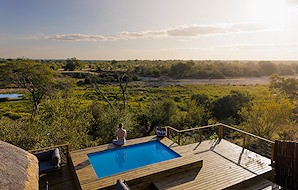
Hilltop lodge has one of the finest settings in Timbavati. Perched on a hilltop, it overlooks the Mbali Dam and Nhlaralumi River in the distance. The lodge offers luxury accommodation.
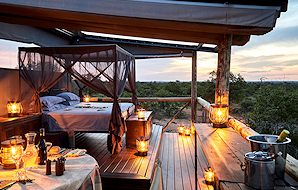
Motswari is a family-owned personal lodge that offers excellent value. It combines comfortable accommodations in a small property with exceptional game viewing.
Timbavati offers game viewing for the Big Five in a large reserve that forms part of the Greater Kruger National Park. The possibility of viewing the famous white lions of Timbavati in the wild is sure to add to the excitement of a wilderness experience in this private game reserve.
The reserve is home to fewer lodges than the Sabi Sand. Visitors do, however, have a choice of Luxury lodges, more affordable personal options, and even greater value offered by the bush camps. Generally speaking, the Timbavati provides more bang for your buck while not compromising on the safari experience.
The number of game-drive vehicles per square kilometer is much lower than in the Sabi Sand. This fact makes it possible to spend more time at each wildlife sighting, which offers better photographic opportunities and gives the rangers more time to share interesting facts.
The experiences revolve around wildlife encounters and an immersion in the natural world.
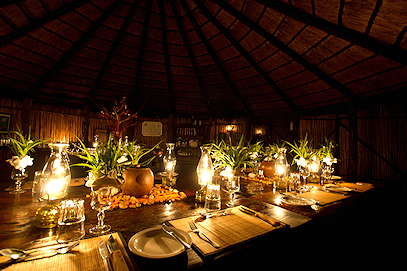
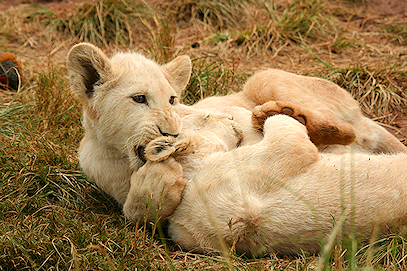
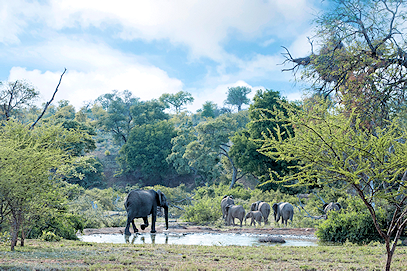
Hoedspruit Airport provides easy access. It is only about a fifteen-minute drive from this airport to the Timbavati Main Gate. Daily flights connect Johannesburg and Cape Town to Hoedspruit. Flight time from Johannesburg is just over an hour, while from Cape Town, it is three hours and twenty minutes.
The drive from Johannesburg to Timbavati is approximately six hours. We recommend that anyone who travels overland do so via Belfast, Dullstroom, Lydenburg, Ohrigstad, and Hoedspruit. Upon reaching Hoedspruit, the Timbavati gate is only about 20km away.
Like the Sabi Sand and the Greater Kruger National Park in Timbavati, it is best to visit during the spring, autumn, and winter months from about the middle of April until the end of September, when the temperatures are moderate, and rainfall does not interfere with game activities.
Each season has its unique charm. Those visiting in the summer months might be hot, but most young animals are born in late October and early November, something extraordinary to witness. The bush is green and lush in summer, creating a much more attractive appearance than in the dry winter.
The Timbavati is in a malaria area; as such, all visitors should discuss anti-malaria precautions with their doctor before their visits.
Once at one of the lodges of the Timbavati, the only safety concern is animals. Heed the rules as explained by your ranger, and there should not be a problem.
Because of growing soil erosion caused by cattle farming and crops, alien invaders supplanted natural vegetation. Dam-building and rerouting of streams and rivers affected the water supply. It resulted in much of the wildlife common to the area disappearing. A group of conservation-minded farmers got together in 1956 and formed the Timbavati Association to reclaim the land. They had seen the wilderness gradually disintegrating and decided to do something about it.
The association's hard work and dedication started paying off, and more farmers joined the conservation effort. Today, more than 50 members have restored Timbavati to its former natural state.
Because the area was attracting more and more attention as a wilderness conservancy area, the Timbavati Association was invited, in 1993, to become part of the Greater Kruger National Park. So all the internal fences were dropped. Removing barriers increased the range over which animals could migrate and improved the gene pool.
In conjunction with the Endangered Wildlife Trust, the Timbavati Private Game Reserve is involved in the vulture nest monitoring program. Two main objectives are involved in this research: the first is to monitor vulture nests in annual use, and the second is to quantify elephant impact on these nesting sites. The research team tags vulture chicks, who also maintain records of locations in the reserve where they are spotted. Timbavati is privileged to have a larger vulture nesting colony than any other private reserves belonging to the Associated Private Nature Reserves (APNR).
The Timbavati Leopard Project is a joint effort involving the reserve, independent researchers, and partners, including Panthera, a global organization that protects the thirty wild cat species found internationally. This research aims to determine the leopard population in Timbavati and the average space used by each animal. In other words, they are determining their home ranges.
The reserve contributes to the long-running Trans Boundary Elephant Research program, encompassing Greater Limpopo Transfrontier Park. This project officially started in 2003 to understand the motivation behind elephant movements from core conservation areas in Southern Africa. The research has resulted in an extensive individual identification database and has contributed significantly to understanding elephant-ranging behavior. Research expanded in 2004 to create a database of elephant impact on selective trees. Part of this research monitors the effects of elephants on trees used as nesting sites by the ground hornbill and vultures.
Timbavati actively contributes data to the Southern Ground Hornbill Research Project to improve this endangered species' long-term management. The Percy Fitzpatrick Institute of African Ornithology runs the project. During the breeding season from October to March, 58 natural and artificial nesting sites are monitored in Timbavati to understand nesting behavior and home ranges better.
Alien plants pose a significant threat to any natural habitat because they grow faster and consume more water than indigenous species. If left unchecked, they multiply rapidly and threaten the local flora and the species that depend on these plants, grasses, and trees.
Based on aerial photographs taken in 2004, researchers identified erosion sites. These sites are not caused by natural conditions but by overgrazing and the improper construction of dams and roads. Almost all erosion sites are restored. The few remaining sites are receiving ongoing attention, and the reserve is committed to a program of constant monitoring to avoid potential future problems.
Malaria is, unfortunately, a fact of life in the entire Lowveld region of South Africa. Timbavati takes active steps to reduce the risk of visitors contracting this disease by spraying around camps regularly during the wet summer months when the risk of contracting the disease is at its highest. Spraying reduces mosquito numbers. As a result of this action, no to very few people ever contract malaria here.
Poaching in general, and rhino poaching specifically, are one of the most significant challenges faced by all protected African areas, whether they are national parks or privately owned reserves. Timbavati is no exception. The reserve employs an anti-poaching unit consisting of well-trained armed rangers.
These men constantly patrol the reserve and have been instrumental in conserving the rhino population in the area. Significant progress has been made here in the last few years in limiting rhino poaching to an absolute minimum.